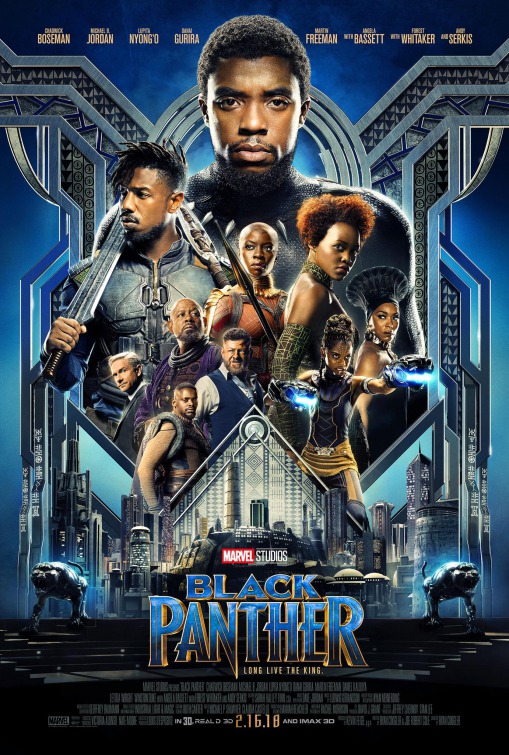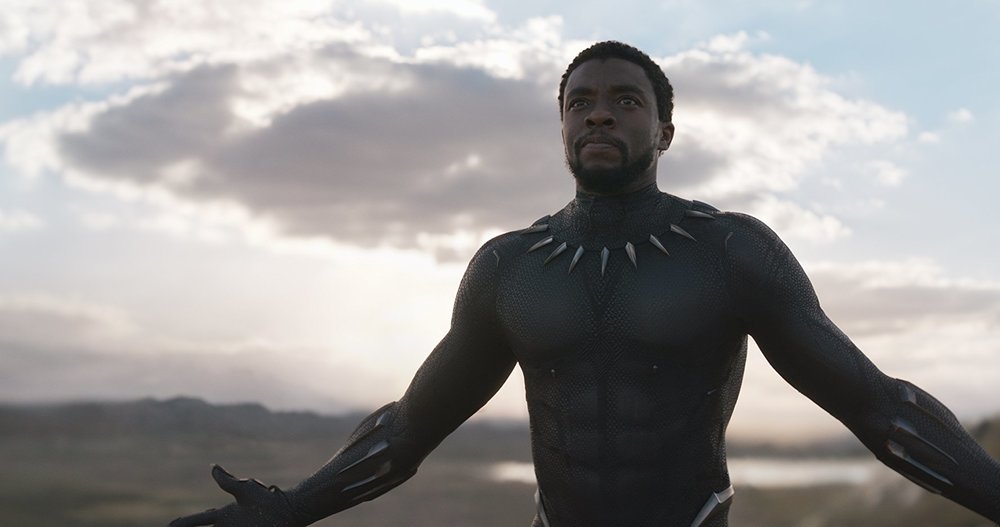Black Panther (2018)


SHOULD I SEE IT?
YES
Seriously? Tickets are on sale. Be a part of history.
Ryan Coogler's superhero movie is full of outstanding performances, breathtaking visuals and imagery, and an ensemble of characters which rivals the best Marvel has ever offered us.
The significance of this film cannot be understated. With that said, the movie essentially works outside of the Marvel Cinematic Universe and does not require you to have seen any other Marvel movies to avoid your enjoying of this.
NO
No matter who stars in it or what the movie is - superhero fatigue won't allow you to enjoy any of these movies anymore.
You have this idiotic anti-Marvel, pro-DC bias which makes zero sense and means you were never going to watch Black Panther objectively in the first place.
You feel threatened by films featuring significant African-American and minority casts and you cannot handle seeing a movie that makes someone who doesn't look like you feel pride, joy, and happiness.
OUR REVIEW
Exiting the theater after watching Ryan Coogler’s eagerly anticipated Black Panther, I found myself smiling. About 2 to 3 hours after, those smiles creased back into my cheeks, I jotted down a number of thoughts that overwhelmed me to the point of unbridled joy and deeply felt satisfaction.
Not so much in the moment, but definitely in the hours after seeing it, Black Panther is a special, important, perhaps even groundbreaking piece of cinema. This is a movie we will be talking about for a long, long time.
First introduced in 2016’s Captain America: Civil War, Black Panther, or T’Challa, as he is known in his home of Wakanda, is portrayed by the chameleonic Chadwick Boseman, who has played Floyd Little, Jackie Robinson, James Brown, and Thurgood Marshall in an already impressive career. While this is technically an origin story, Boseman is able to settle in to his character right away. The movie begins essentially in Oakland, 1992, where a family betrayal begins T’Challa's fateful journey to becoming the Wakandan king.
We flash back to Captain America: Civil War only briefly to see T’Challa’s father assassinated in a terrorist attack, setting the stage for T’Challa’s coronation. Several strong women – his proud and beaming mother (Angela Bassett), his tell-it-like-it-is sister Shuri (Letitia Wright), the fierce and dominating head of his security detail, Okoye (Danai Gurira), and former girlfriend and Wakandan spy Nakia (Lupita Nyong’o) -- all surround him, support him, and keep his ego in check.
Per custom, the factions in Wakanda all come to the ceremonial waterfall to endorse and accept their new leader. One faction however, the Jabari, put forth a fighter to challenge the new king, and once the battle is complete, T’Challa retains his kingdom.
Elsewhere, two villains are circling the wagons to come after Wakanda and its new leader. Ulysses Klaue (Andy Serkis) is a sadistic weapons dealer, who uses a prosthetic arm powered by Wakanda’s most lucrative metal and substance – vibranium. In a London museum, an American soldier named Erik Killmonger (Michael B. Jordan) sets out to seize control of Wakanda’s vibranium reserves and give it out to everyone. Doing so would expose the secretive realities of Wakanda, which looks third-world poor to the outside world, but is actually the most technologically advanced nation on the planet.
In his third feature film, Coogler has serious command over this material. Co-written with frequent collaborator Joe Robert Cole, the filmmaker senses the importance of the project, but never allows those perceptions and anticipations overshadow his vision. His presentation of Wakanda is a frequently breathtaking spectacle, captured beautifully by Oscar-nominated cinematographer Rachel Morrison (Mudbound).
One of the more striking elements of the film, and one which makes it feel quite different than any other Marvel film to date, is how genuine this all feels. The interactions between Boseman and Wright, as brother and sister, feels authentic, with Wright stealing much of her time on screen as not just the newly crowned King’s baby sister, but also as his gadgeteer, or his “Q”, for all you Bond fans out there.

Wright’s fantastic performance, along with a rejuvenated Nyong’o and a commanding Gurira, provide a triad of significant female characters impressively created in collaboration between actor, writer, and director.
Many of the complaints surrounding Marvel’s films are the lackluster presentation of villains for the superheroes to overcome. Coogler’s history of working with Jordan on his previous films - Fruitvale Station and Creed - reaps great rewards here with Killmonger a fascinating creation.
There's layers to Killmonger and an underlying tension that Coogler is not afraid to explore. His motivations may lead to conflict and he may fall in line with the nasty, gauche Klaue, but there is a palpable rage and seething frustration pouring out of Killmonger that feels timely and topical. Killmonger might be the most complex threat a superhero has ever faced in the MCU, and Jordan’s sublime performance is bold and rich.
Occasionally, the film stumbles. A choppy beginning, powered by a limited appearance from "This Is Us" Emmy winner Sterling K. Brown, starts things off a little uneven and Coogler’s decision to shoot fight sequences in tight closeups, with a hyperbolic editing pace, tends to frustrate, allowing us to fairly wonder out loud if the actors struggled with their fight choreography.
But then we see Shuri verbally humble her kingly brother. Jordan captivates us with word and appearance. Serkis’ over-the-top villainous ways offers an antidote to any melodramatic tendencies these superhero movies often use as a crutch. Perhaps composer Ludwig Göransson’s score also propels us forward, because the soundtrack curated by Kendrick Lamar underscores and defines a few key scenes in such brilliant fashion.
Reflecting on Black Panther, there is a sense of community within this film, a fearless, breathtaking boldness that brings to light a power which sneaks up on you. Coogler’s film is going to upset some folks because, cleverly coiled within this Marvel movie, is a thoughtful treatise on the African-American experience both off and on screen. The film never preaches, but infuses real-world truths in a subtle and nuanced way.
I think it trivializes Black Panther to call it this year’s Wonder Woman, but perhaps both films achieve unity, or common ground, by deftly stripping away long-seeded and galling biases, traits and characteristics, which we have needed to see removed for our pop culture norms for a long, long time.
Sure, this is a superhero movie. And yes, it is Marvel’s 18th entry in the Marvel Cinematic Universe. And though box office numbers say otherwise, superhero fatigue remains in place for lots of people. And of course, you will find some formulaic moments in the good guy/bad guy dynamic and genre trappings which somehow seem unavoidable in films like this.
But make no mistake: Black Panther signifies a watershed moment for pop culture, for African-American moviegoers and families who have supported hundreds and hundreds (thousands, maybe?) of major studio blockbusters over the years, never having the opportunity to experience an on-screen superhero, geared towards families, they can truly call their own.
This movie matters. And Ryan Coogler has delivered one impressive final product.
CAST & CREW
Starring: Chadwick Boseman, Michael B. Jordan, Lupita Nyong'o, Danai Gurira, Letitia Wright, Andy Serkis, Martin Freeman, Daniel Kaluuya, Winston Duke, Sterling K. Brown, Angela Bassett, Forrest Whitaker, Florence Kasumba, John Kani.
Director: Ryan Coogler
Written by: Ryan Coogler, Joe Robert Cole
Release Date: February 16, 2018
Walt Disney Pictures
